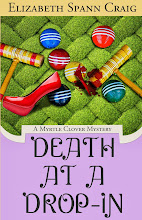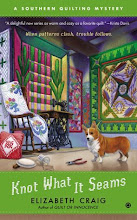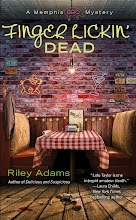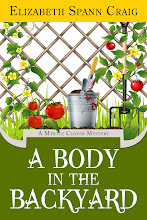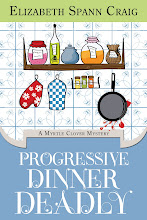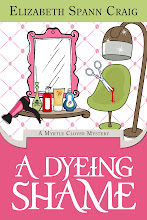by Elizabeth S. Craig, @elizabethscraig
I don't usually watch a lot of television.
One of the reasons is that I’m so short on time and jealously guard the free
time I do have. I don’t want to waste it
on bad TV.
Then, by the time it finally trickles
down into my consciousness that something is a good
show, it’s probably two or three seasons in…I’m just that out of the loop. By
that point, it seems useless to even try to catch up.
But at some point, networks started
realizing that if they aired old episodes online, they could snag new
viewers. My sister-in-law assured me
that I’d enjoy Lost which was airing
on ABC. At the time, the show's last season was about to air. I started watching episode one on my laptop
during my lunch one day. I continued
watching an episode or even more each day after that until I was finished
catching up by the time the final season aired.
What’s more, I felt like I’d really followed the fairly convoluted plot
because of the way I’d chosen to consume the show. It had been a self-paced marathon.
I’ve been fascinated by the way Netflix is approaching television with their February 1 release of House of Cards. They left the pacing up to the viewers by releasing all thirteen episodes of the season at once. I’ve watched the series and it’s a strangely addicting process to view a show knowing you can just keep going once the credits start rolling. You want to keep watching and see what happens next. What’s more—the show is available for you when you’re available for it. If you’ve got a block of free time, you can watch more than the usual weekly new episode that’s allotted to viewers by the networks.
I’ve been fascinated by the way Netflix is approaching television with their February 1 release of House of Cards. They left the pacing up to the viewers by releasing all thirteen episodes of the season at once. I’ve watched the series and it’s a strangely addicting process to view a show knowing you can just keep going once the credits start rolling. You want to keep watching and see what happens next. What’s more—the show is available for you when you’re available for it. If you’ve got a block of free time, you can watch more than the usual weekly new episode that’s allotted to viewers by the networks.
I’ve also noted, with interest, the
success some self-published authors have had
with putting up large numbers of books at once, or releasing books in
rapid succession. I believe this has
been a contributing factor in some authors’ success…resulting in increased
visibility at online retailers (specifically Amazon.) Romance writer, Barbara Freethy, released a
substantial backlist very quickly. Amanda Hocking wrote quite a
few books before releasing any (she was trying to break into traditional
publishing and wrote other books as she submitted, as she outlined in her post:
“An
Epic Tale of How it all Started.”
Hugh Howey began seeing success with his first installment of Wool and was encouraged to outline the rest of
the story and accelerate his output…forgoing NaNoWriMo
to focus on working on Wool, as he
explains in his post “The Story of
My Middling Success.” It’s also,
obviously, very important to have some quality control for what you’re
releasing…these books weren’t written and published in haste, but over a period
of time.
Back to the television, Netflix
is also being innovative by using data as part
of their creative process. Greg
Satall writes in “What
Netflix’s House of Cards Means for the Future of TV” for Forbes: “Finally,
it’s the first time that programming has been developed with the aid of big data algorithms.” Jessica Leber
for the MIT Technology Review stated in
her article, “House of Cards and Our Future of Algorithmic
Programming”: "(Netflix) bought House of Cards based on what it knows about
the viewing habits of its 33 million users—it knew which and how many users
watch movies starring Kevin Spacey and the director David Fincher, and, through
its tagging and recommendation system, how many sat through other similar
political dramas. It has shown different trailers to people depending on their
particular viewing habits, too."
As authors, we don’t have as much data
available to us as media providers like Netflix and retailers like Amazon…but
we do have some, and we can make educated guesses as to other data. We can measure reader response to titles, covers,
and stories by tracking sales. We can review the highlighted sections on the
bottom of our book’s sale page to see what resonates with readers. We can study our reviews on retail sites like
Amazon, and book sharing sites like Goodreads (now owned by Amazon), even if
that’s painful for us (and it’s sure a lot easier if we can adopt an analytical
approach to the reviews.)
As I mentioned, I’m fascinated by these
developments. I see exciting
possibilities for writers…but I also see some potential pitfalls. I’m going to post part two of this post
(since this first is becoming a bit longwinded) on Friday…and I’d love to hear
your thoughts, too.
What excites or concerns you about the a
possible change in viewing/reading/consumer habits for entertainment? Do you see a place for algorithms in
publishing? In the creative process,
itself?






